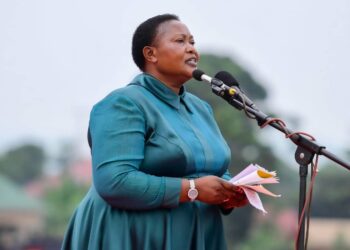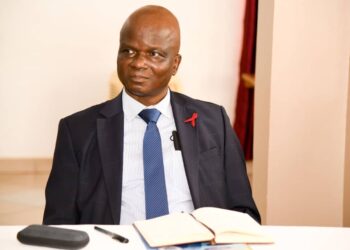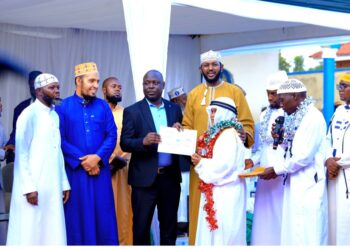Joseph Kabila Kabange is a Congolese politician who has been President of the Democratic Republic of the Congo since January 2001. He took office ten days after the assassination of his father, President Laurent-Désiré Kabila. He was elected as President in 2006. In 2011, he was re-elected for a second term.
Kabila’s term was due to expire on 20 December 2016 per the constitution, adopted in 2006. Officials suggested that elections would be held in November 2016. However, on 29 September 2016, the nation’s electoral authority announced that the election would not be held until early 2018. Talk has focused on the need for a census before holding elections.
Since coming to power, Joseph Kabila has faced continuous wars in eastern Congo and internal rebel forces supported by neighboring governments of Uganda and Rwanda.
Joseph Kabila Kabange and his twin sister Jaynet Kabila were born on 4 June 1971. According to official accounts, the twins were born at Hewabora, a small village in the Fizi territory of the South Kivu province, in eastern Congo. Rumors have abounded that Kabila was actually born in Tanzania, which would make him a citizen of that country.
He is the son of long time rebel, former AFDL leader and president of the Congo Laurent-Désiré Kabila and Sifa Mahanya.
Kabila’s childhood coincided with the low point of his father’s political and military career. He was raised in relative remoteness, with few records of his early days. Kabila attended a primary school organized by his father’s rebel forces, before moving to Tanzania where he completed primary and secondary school. Due to his father’s status as an enemy of Zairean strongman Mobutu Sese Seko, Kabila posed as a Tanzanian in his school years to avoid detection by Zairean intelligence agents.
Following high school, Joseph Kabila followed a military curriculum in Tanzania, then at Makerere University in Uganda.
In October 1996, Laurent-Désiré Kabila launched the campaign in Zaire to oust the Mobutu regime with his newly formed army, the Alliance of Democratic Forces for the Liberation of Congo-Zaire (AFDL). Joseph Kabila became the commander of an AFDL unit that included “kadogos” (child soldiers) and likely played a key role in major battles on the road to Kinshasa, but his exact whereabouts during the war have been difficult to establish.
Joseph Kabila appears to have been present at the liberation of Kisangani where media reports identified him as commander of the rebel force that took the city after four days of intense fighting.
Following the AFDL’s victory, and Laurent-Désiré Kabila’s rise to the presidency, Joseph Kabila went on to get further training at the PLA National Defense University, in Beijing, China.
When he returned from China, Kabila was awarded the rank of Major-General, and appointed Deputy Chief of Staff of the Armed Forces of the Democratic Republic of the Congo, in 1998. He was later, in 2000, appointed Chief of Staff of the Land Forces, a position he held until the elder President Kabila’s assassination in January 2001.
As chief of staff, he was one of the main military leaders in charge of government troops during the time of the Second Congo War (1998–2003).
Joseph Kabila rose to the presidency on 26 January 2001 after the assassination of Laurent-Désiré Kabila, becoming the world’s first head of government born in the 1970s.
Aged 29, he was considered young and inexperienced. He subsequently attempted to end the ongoing civil war by negotiating peace agreements with rebel groups backed by Rwanda and Uganda, the same regional armies who had brought Laurent-Désiré Kabila’s rebel group to power three years before.
The 2002 peace agreement signed at the Inter-Congolese Dialogue in Sun City, South Africa, which nominally ended the Second Congo War, maintained Joseph Kabila as President and head of state of the Congo. An interim administration was set up under him, including the leaders of the country’s two main rebel groups as vice-presidents (two other vice-presidents were representatives of the civilian opposition and government supporters respectively).
On 28 March 2004, an apparent coup attempt or mutiny around the capital Kinshasa, allegedly by members of the former guard of former president Mobutu Sese Seko (who had been ousted by Kabila’s father in 1997 and died in the same year), failed.
On 11 June 2004, coup plotters led by Major Eric Lengeallegedly attempted to take power and announced on state radio that the transitional government was suspended, but were defeated by loyalist troops.
In December 2011, Kabila was re-elected for a second term as president. After the results were announced on 9 December, there was violent unrest in Kinshasa and Mbuji-Mayi, where official tallies showed that a strong majority had voted for the opposition candidate Etienne Tshisekedi.
According to the Constitution of the Democratic Republic of the Congo, President Kabila should not be allowed to serve more than two terms. On 19 September 2016, massive protests calling for him to step down as legally mandated rocked Kinshasa. Seventeen people were killed.
Elections to determine a successor to Kabila were originally scheduled to be held on 27 November 2016. On 29 September 2016, the nation’s electoral authority announced that the election would not be held until early 2018. According to the electoral commission’s vice president, the commission “hasn’t called elections in 2016 because the number of voters isn’t known.
However, the opposition alleges that Kabila had intentionally delayed the election to remain in power.
Joseph Kabila’s second term as president of the Democratic Republic of Congo was due to end on 20 December 2016. A statement issued by his spokesperson on 19 December 2016, stated that Joseph Kabila would remain in post until a new president is in place following elections which will not be held until at least April 2018. Kabila subsequently installed a new cabinet led by prime minister Samy Badibanga, resulting in protests in which at least 40 people were killed.Under articles 75 and 76 of the Constitution of the Democratic Republic of Congo, should the office of the president become vacant, the Chairman of the Senate, presently Léon Kengo would assume the presidency in an acting capacity.
On 23 December, an agreement was proposed between the main opposition group and the Kabila government under which the latter agreed not to alter the constitution and to leave office before the end of 2017. Under the agreement opposition leader Étienne Tshisekedi will oversee that the deal is implemented and the country’s Prime Minister will be appointed by the opposition.
In late February 2018 the ministry of international affairs of Botswana told Kabila that it was time to go and said the “worsening humanitarian situation” in DRC is compounded by the fact that “its leader has persistently delayed holding elections, and has lost control over the security of his country”.
Kabila married Olive Lembe di Sita, on 1 June 2006. The wedding ceremonies took place on 17 June 2006 Kabila and his spouse have a daughter, born in 2001, named Sifa, after Kabila’s mother.
Wikipedia
Do you have a story in your community or an opinion to share with us: Email us at editorial@watchdoguganda.com











